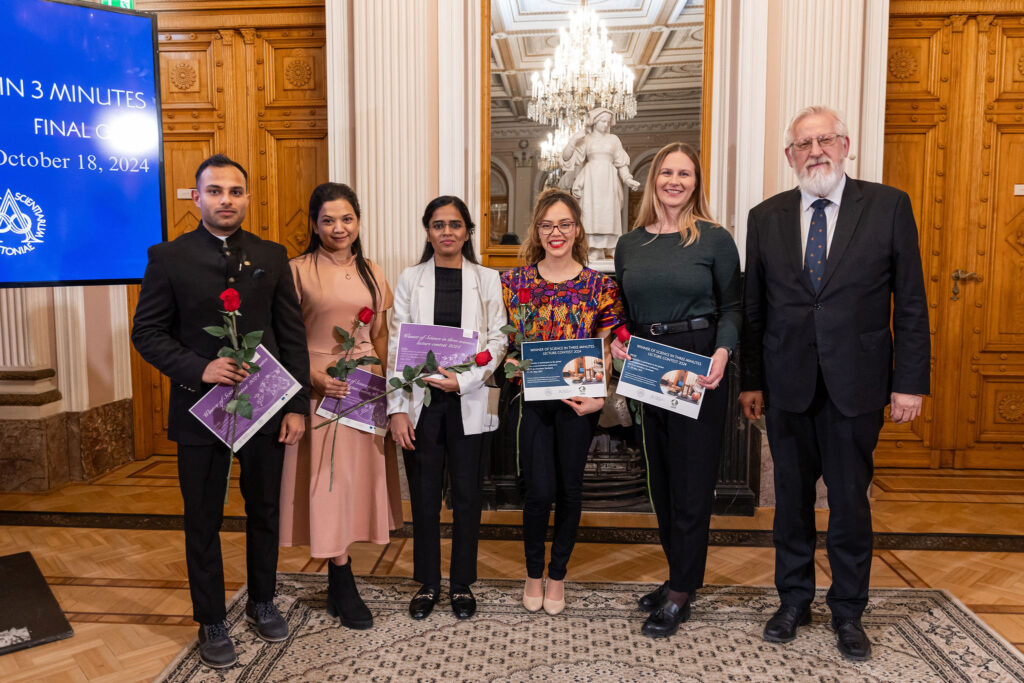At the final gala of the “Science in 3 minutes” contest first ever English edition, held last night at the Estonian Academy of Sciences, the five best foreign PhD students studying at Estonian universities were awarded.
The laureates of the contest are:
- Francis Gracy Arockiaraj with the lecture “Seeing through Fog, Mist and Skin Tissues” (University of Tartu, country of origin India)
- Baiba Brumele with the lecture “TRMT112 – the mysterious link between different diseases“ (University of Tartu, country of origin Latvia)
- Mehruba Shabaab Haque with the lecture “Redefining Beauty for Young Girls in the Age of Social Media” (Estonian Business School, country of origin Bangladesh)
- Sharib Khan with the lecture “If not plastics, then what? ” (Estonian University of Life Sciences, country of origin India)
- Lucía Mariel Arana Peña with the lecture “Caring through quality: Enhancing Mammography from afar” (Tallinn University of Technology, country of origin Guatemala).
The five winners will get the opportunity to participate in the most prominent global science communication conference, PSCT, in Aberdeen, Scotland, on the 27th-29th of May 2025. The Estonian Research Council will cover participation and travel costs of three winners through Research in Estonia activities. The prizes are co-funded by the European Union. The costs of two winners will cover Estonian Academy of Sciences with the help from main sponsor.
Announcing the jury's decision, the President of the Academy of Sciences of Estonia Tarmo Soomere said, that the presentations of finalists were technically almoust perfect, with powerful start, clear introduction and hooked the audience strongly. The text was excellently merged with visuals, finalists used clear and finished sentences and sparingly words. “Only few used all the allocated time – wchich is good: the more compact you are, the more convinced you are.”
The editors of the science portal Novaator also chose three favourite popular science articles written by finalists. Highlighted were:
- Larissa Barbosa Curi for the article “Horror film viewers might actually want to listen to stories” (Tallinn University Baltic Film and Media School, country of origin Brazil)
- Sajeesh Vadakkedath Gopi for the article “Estonia’s Cutting-Edge Solar Cells Aim to Tackle Growing Forest Fire Threats” (Tallinn University of Technology, country of origin India)
- Vittoria Ecclesia for the article “A 13-Keyed Clarinet May Transform Classical Music Practice” (Estonian Academy of Music and Theatre, country of origin Italy).
They will get an opportunity to participate in the science writing workshop in Tartu in November this year. The workshop will be conducted by Seth Mnookin, a Professor of Comparative Media Studies/Writing at MIT (Massachusetts Institute of Technology) and the Director of the Institute's Graduate Program in Science Writing. Seth Mnookin's travel expenses to Estonia are covered by the Baltic American Freedom Fund (BAFF), and the Estonian Research Council covers the workshop expenses through Research in Estonia activities that are co-funded by the European Union.
19 foreign PhD students, representing seven Estonian universities, reached the finals. At the final gala the finalists had to summarize their years of research in three minutes in a way that is interesting and comprehensible to all listeners, regardless of background or prior knowledge.
The jury of the contest at the final event included: Tarmo Soomere, US Ambassador to Estonia George P. Kent; Management Board Member of Inclusive Financial Technology Foundation (InFTF), Kristjan Järve; Secretary-General of Estonian Commission for UNESCO, Kerli Gutman-Normak; entrepreneur and Member of the Digital Council of the President of the Republic of Estonia Mr Alar Karis, Kaidi Ruusalepp; entrepreneur and Chairman of the board of Tuleva Commercial Association, Annika Uudelepp; journalist of the Estonian Public Broadcasting, Joosep Värk.
The finals have been preceded by internal contests in participating universities and trainings on presentation and writing skills organized by the Estonian Academy of Sciences. Also, each finalist has written a popular science article on their research, which will be published on the Research in Estonia portal.
All finalists can be found here.
A live broadcast of the gala evening can be watched on the Academy's Youtube channel.
Photos of the final event (by Reti Kokk) can be found here (the gallery will be updated soon).
The contest is organized by Estonian Academy of Sciences in cooperation with the Estonian Young Academy of Sciences and supported by InFTF and the Estonian Research Council through Research in Estonia activities.
